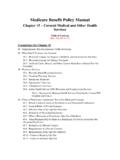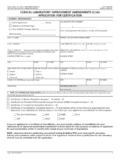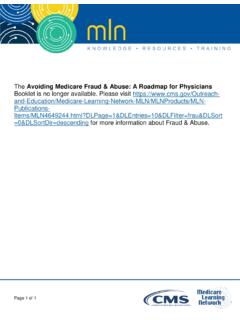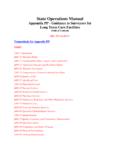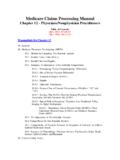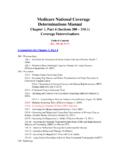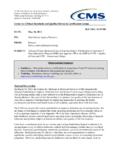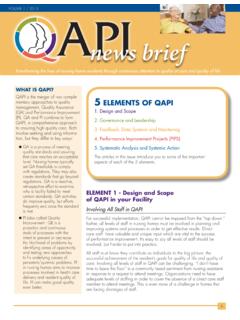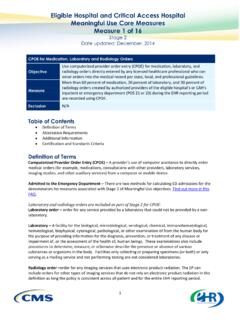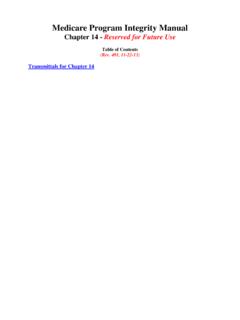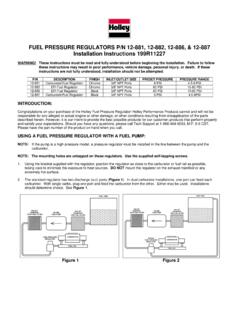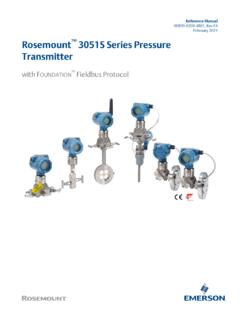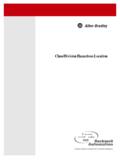Transcription of Coronavirus Disease 2019 (COVID-19) Provider Burden …
1 July 2020 1 Coronavirus Disease 2019 (COVID-19) Provider Burden Relief Frequently Asked Questions (FAQs) Q. Is CMS suspending most Medicare Fee-For-Service (FFS) medical review during the Public Health Emergency (PHE) for the COVID-19 pandemic? A. On March 30 CMS suspended most Medicare Fee-For-Service (FFS) medical review because of the COVID-19 pandemic. This included pre-payment medical reviews conducted by Medicare Administrative Contractors (MACs) under the Targeted Probe and Educate program, and post-payment reviews conducted by the MACs, Supplemental Medical Review Contractor (SMRC) reviews and Recovery Audit Contractor (RAC). As states reopen, and given the importance of medical review activities to CMS program integrity efforts, CMS expects to discontinue exercising enforcement discretion beginning on August 3, 2020, regardless of the status of the public health emergency. If selected for review, providers should discuss with their contractor any COVID-19-related hardships they are experiencing that could affect audit response timeliness.
2 CMS notes that all reviews will be conducted in accordance with statutory and regulatory provisions, as well as related billing and coding requirements. Waivers and flexibilities in place at the time of the dates of service of any claims potentially selected for review will also be applied. Q. Is CMS enforcing signature requirements on proof of delivery slips in response to the COVID-19 pandemic, for Dates of Service (DOS) within the PHE for the COVID- 19 pandemic? A. Given the nature of the pandemic and the inability to collect signatures during this time, CMS will not be enforcing the signature requirement. Typically, Part B drugs and certain Durable Medical Equipment (DME) covered by Medicare require proof of delivery and/or a beneficiary s signature. Suppliers should document in the medical record the appropriate date of delivery and that a signature was not able to be obtained because of COVID-19.
3 Q. For ambulance services that require a physician or certain non-physician personnel to sign and certify that a non-emergency ambulance transport is medically necessary, are these signature requirements not required during the COVID-19 PHE? A. We understand that in certain situations during the COVID-19 PHE it may not be feasible to obtain the practitioner signature. Therefore, for claims with dates of service during the COVID- 19 PHE (January 27, 2020, until expiration), CMS will not review for compliance with appropriate signature requirements for non-emergency ambulance transports during medical review, absent indication of fraud or abuse. Ambulance providers and suppliers should indicate in the documentation that a signature was not able to be obtained because of the ongoing COVID-19 pandemic. However, we note that Medicare Part B covers ambulance transport July 2020 2 services only if they are furnished to a Medicare beneficiary whose medical condition is such that other means of transportation are contraindicated, and the beneficiary s condition must require both the ambulance transportation itself and the level of service provided in order for the billed service to be considered medically necessary.
4 Q. Is CMS pausing the Repetitive, Scheduled Non-Emergent Ambulance Transport (RSNAT) Prior Authorization Model? A. Effective March 29, 2020, certain claims processing requirements for the Repetitive, Scheduled Non-Emergent Ambulance Transport Prior Authorization Model were paused in the model states of Delaware, the District of Columbia, Maryland, New Jersey, North Carolina, Pennsylvania, South Carolina, Virginia, and West Virginia because of the COVID-19 pandemic. During the pause, claims for repetitive, scheduled non-emergent ambulance transports submitted on or after March 29, 2020, were not stopped for pre-payment review if prior authorization had not been requested by the fourth round trip in a 30-day period. During the pause, CMS (through the MACs) continued to review any prior authorization requests that were submitted. Given the importance of prior authorization activities to CMS program integrity efforts, CMS expects to discontinue exercising enforcement discretion beginning on August 3, 2020, regardless of the status of the public health emergency.
5 CMS will resume full model operations and prepayment review will resume for repetitive, scheduled non-emergent ambulance transport claims submitted in the model states on or after August 3, 2020, if prior authorization has not been requested by the fourth round trip in a 30-day period. Following resumption of the model, the MAC will conduct postpayment review on claims that were subject to the model that were submitted and paid during the pause. CMS will work with affected providers to develop a schedule for postpayment reviews that not does significantly increase Provider Burden . Claims that received a provisional affirmation prior authorization review decision and were submitted with an affirmed Unique Tracking Number (UTN) will continue to be excluded from most future medical review. Q. The RSNAT model is currently scheduled to end on December 1, 2020. Given this pause, will CMS extend the model beyond that date?
6 A. At this time, CMS is not planning an extension beyond December 1, 2020. If this did occur, CMS would provide proper public notice. Q. How does this pause in the RSNAT model affect a determination as to whether the model meets the criteria to be expanded nationwide, as provided under section 1834(l)(16) of the Social Security Act, and any next steps for expansion? A. The pause in the model does not affect the efforts to expand the model nationwide as provided under section 1843(l)(16). CMS continues its efforts to prepare for expansion. July 2020 3 Q. How does this pause in the model affect evaluation of the RSNAT model? A. The evaluation of the model will take into consideration the pause for the PHE for the COVID-19 pandemic. Those claims will be reviewed through post payment review and will still be factored into the evaluation. Q. Is CMS pausing the Review Choice Demonstration for Home Health Services?
7 A. Effective March 29, 2020, certain claims processing for the Review Choice Demonstration (RCD) for Home Health Services were paused in Illinois, Ohio, and Texas, because of the COVID-19 pandemic. During the pause, home health claims submitted on or after March 29, 2020, were not be subject to the review choices made by home health agencies under the demonstration. However, the MAC continued to review any pre-claim review requests that were submitted. Given the importance of prior authorization activities to CMS program integrity efforts, CMS expects to discontinue exercising enforcement discretion beginning on August 3, 2020, regardless of the status of the public health emergency. CMS will resume demonstration operations in all states. The initial choice selection period will begin in North Carolina and Florida on August 3, 2020 and end on August 17, 2020. The choice selection period for Ohio s second review cycle will also begin August 3, 2020 and end on August 17, 2020.
8 Following these choice selection periods, home health claims in all demonstration states (Illinois, Ohio, Texas, North Carolina, and Florida) with billing periods beginning on or after August 31, 2020, will be subject to review under the terms of the choice selected by the Provider . This includes pre-claim review, prepayment review, postpayment review, or any applicable 25% payment reduction. Following the resumption of the demonstration, the MAC will conduct postpayment review on claims subject to the demonstration that were submitted and paid during the pause. CMS will work with affected providers to develop a schedule for postpayment reviews that not does significantly increase Provider Burden . Claims that received a provisional affirmative pre-claim review decision and were submitted with an affirmed Unique Tracking Number (UTN) will continue to be excluded from most future medical review.
9 CMS will provide additional details about the choice period on its demonstration website. Q. The Home Health demonstration is currently scheduled to end on May 31, 2024. Given this pause, will CMS extend the demonstration beyond that date? A. At this time, CMS is not planning an extension beyond May 31, 2024. If this did occur, CMS would provide proper public notice. July 2020 4 Q. Is a signature required for all Durable Medical Equipment, Prosthetics, Orthotics, and Supplies (DMEPOS) orders prior to submitting claims for payment during the COVID-19 PHE? A. Yes, all DMEPOS orders require a signature prior to submitting claims for payment. However, all DMEPOS, except Power Mobility Devices (PMDs), can be provided via a verbal order. PMDs require a signed, written order prior to delivery. Practitioners should note that orders can be signed electronically. Q. When is CMS resuming the Prior Authorization Program for DMEPOS items?
10 A. Given the importance of medical review activities to CMS program integrity efforts, CMS expects to discontinue exercising enforcement discretion beginning on August 3, 2020, regardless of the status of the public health emergency. CMS will resume full operations for the prior authorization program for certain DMEPOS items. For Power Mobility Devices and pressure Reducing Support Surfaces that require prior authorization as a condition of payment, claims with an initial date of service on or after August 3, 2020, must be associated with an affirmative prior authorization decision to be eligible for payment. For an updated list of items that require prior authorization please visit: Q. When will CMS begin prior authorization for certain Lower Limb Prosthetics (LLP)? A. Prior authorization will be required for certain LLPs (Healthcare Common Procedure Coding System codes L5856, L5857, L5858, L5973, L5980, and L5987), with dates of service on or after September 1, 2020, in California, Michigan, Pennsylvania, and Texas.
